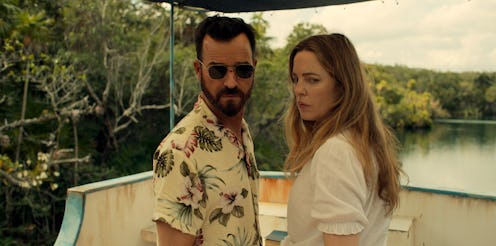Streaming
The Mosquito Coast Book Ending Includes A Major Character’s Death
The author’s nephew Justin Theroux stars in the Apple TV+ adaptation.

Based on Paul Theroux’s best-selling 1981 novel of the same name, Apple TV+’s The Mosquito Coast certainly has the prolific novelist and travel writer’s approval. Not only does he serve as executive producer, but the author’s nephew, actor Justin Theroux, also stars in the series as protagonist Allie Fox, a brilliant inventor and stubborn idealist. As for how the show compares to his book, the elder Theroux called the streamer’s version “a true adaptation” in a May 2021 Town & Country interview.
“It's been converted into long form, in essence,” the author explained, contrasting the series with the 1986 movie version, which starred Harrison Ford and Helen Mirren. “A series is a truer reflection of a book: you can extend it more, there are subplots, there is more texture, more room in it. It's how books were first published, of course. Dickens came out as a series. It feels natural.”
With the first season playing out like an expanded prequel, however, The New York Times noted in their April 2021 review that the Apple TV+ series “has so little in common” with Theroux’s novel that “comparison doesn’t get you far.” In addition to serializing the book, other differences included new characters, motivations, changes to the setting and Allie’s occupation, along with the fact that his wife (played by Melissa George) is given the name Margot, though she was called only “Mother” in the original version. With Season 2 eventually premiering in November 2022, it became clear that the streaming version was intended to be a multiseason variation, which could spell tragedy for Allie, depending on how closely the Neil Cross-penned series follows the source material.
In Theroux’s book, Allie is a self-taught engineer and inventor living in Hatfield, Mass., with his patient wife and four children, and making a living by doing odd jobs for a local farmer. Consumed by his quest to fend off a culture of American fast foods, television, drugs, crime, pollution, pornography, religious fanaticism, and cheap imports, he picks up and moves his family to the remote jungles of Honduras.
There, Allie, whom the natives call “Father,” settles at an overgrown clearing dubbed the '“town” of Jeronimo, bringing his “better world,” which includes flourishing crops, stable homes, plumbing, and the like, giving him a God complex of sorts. The centerpiece: Allie’s ice maker invention, which he named “Fat Boy” after the Hiroshima bomb. An atheist, Allie becomes desolated when the natives, who he’d assumed are aboriginal, recognize his invention and honor it by reciting the Lord's Prayer in broken English. Realizing there’s no untouched civilization for him to build from scratch, his mental health deteriorates as he becomes increasingly paranoid.
When three white men with guns enter the settlement and refuse to leave, Allie locks them in the icehouse, which soon explodes and burns down the entire village. So the Foxes flee by boat to Laguna Miskita, where the patriarch’s delusions devolve into him believing in an alternate reality where the United States has been destroyed by nuclear holocaust, and he is the last white man on Earth. When torrential rains force him to move his family’s boat home upstream, Allie encounters a missionary settlement, forcing him to confront the fact that he’d been wrong about the destruction of modern society.
Infuriated, Allie sets fire to the missionary's generator and airplane and is shot in the process. Though he and his family escape, the wounds eventually prove to be fatal, and Allie dies while attempting to return to the jungle. After burying his body on the beach, the surviving Foxes eventually return home.